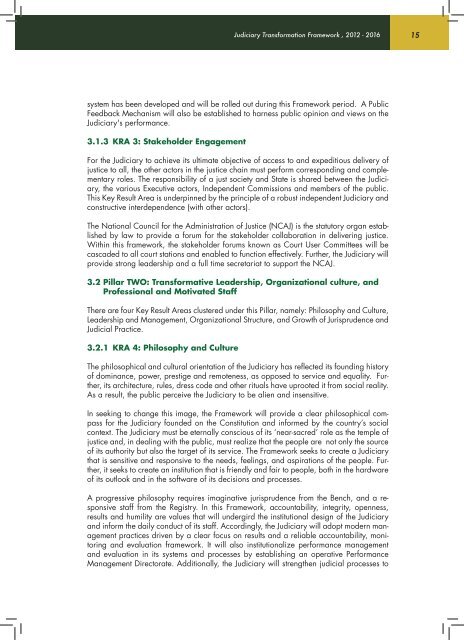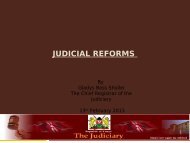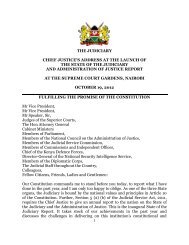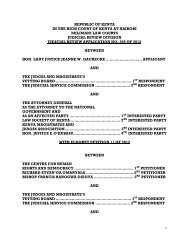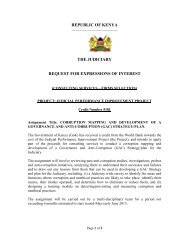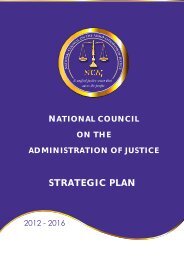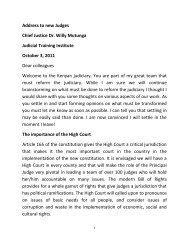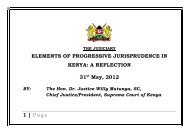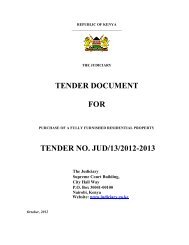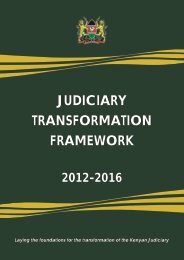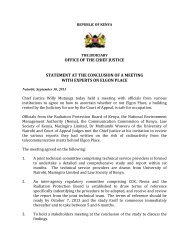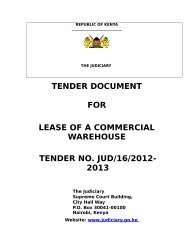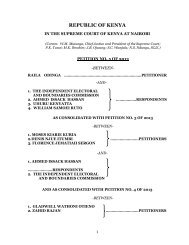judiciary transformation framework 2012-2016 - The Judiciary
judiciary transformation framework 2012-2016 - The Judiciary
judiciary transformation framework 2012-2016 - The Judiciary
You also want an ePaper? Increase the reach of your titles
YUMPU automatically turns print PDFs into web optimized ePapers that Google loves.
<strong>Judiciary</strong> Transformation Framework , <strong>2012</strong> - <strong>2016</strong> 15<br />
system has been developed and will be rolled out during this Framework period. A Public<br />
Feedback Mechanism will also be established to harness public opinion and views on the<br />
<strong>Judiciary</strong>'s performance.<br />
3.1.3 KRA 3: Stakeholder Engagement<br />
For the <strong>Judiciary</strong> to achieve its ultimate objective of access to and expeditious delivery of<br />
justice to all, the other actors in the justice chain must perform corresponding and complementary<br />
roles. <strong>The</strong> responsibility of a just society and State is shared between the <strong>Judiciary</strong>,<br />
the various Executive actors, Independent Commissions and members of the public.<br />
This Key Result Area is underpinned by the principle of a robust independent <strong>Judiciary</strong> and<br />
constructive interdependence (with other actors).<br />
<strong>The</strong> National Council for the Administration of Justice (NCAJ) is the statutory organ established<br />
by law to provide a forum for the stakeholder collaboration in delivering justice.<br />
Within this <strong>framework</strong>, the stakeholder forums known as Court User Committees will be<br />
cascaded to all court stations and enabled to function effectively. Further, the <strong>Judiciary</strong> will<br />
provide strong leadership and a full time secretariat to support the NCAJ.<br />
3.2 Pillar TWO: Transformative Leadership, Organizational culture, and<br />
Professional and Motivated Staff<br />
<strong>The</strong>re are four Key Result Areas clustered under this Pillar, namely: Philosophy and Culture,<br />
Leadership and Management, Organizational Structure, and Growth of Jurisprudence and<br />
Judicial Practice.<br />
3.2.1 KRA 4: Philosophy and Culture<br />
<strong>The</strong> philosophical and cultural orientation of the <strong>Judiciary</strong> has reflected its founding history<br />
of dominance, power, prestige and remoteness, as opposed to service and equality. Further,<br />
its architecture, rules, dress code and other rituals have uprooted it from social reality.<br />
As a result, the public perceive the <strong>Judiciary</strong> to be alien and insensitive.<br />
In seeking to change this image, the Framework will provide a clear philosophical compass<br />
for the <strong>Judiciary</strong> founded on the Constitution and informed by the country’s social<br />
context. <strong>The</strong> <strong>Judiciary</strong> must be eternally conscious of its ‘near-sacred’ role as the temple of<br />
justice and, in dealing with the public, must realize that the people are not only the source<br />
of its authority but also the target of its service. <strong>The</strong> Framework seeks to create a <strong>Judiciary</strong><br />
that is sensitive and responsive to the needs, feelings, and aspirations of the people. Further,<br />
it seeks to create an institution that is friendly and fair to people, both in the hardware<br />
of its outlook and in the software of its decisions and processes.<br />
A progressive philosophy requires imaginative jurisprudence from the Bench, and a responsive<br />
staff from the Registry. In this Framework, accountability, integrity, openness,<br />
results and humility are values that will undergird the institutional design of the <strong>Judiciary</strong><br />
and inform the daily conduct of its staff. Accordingly, the <strong>Judiciary</strong> will adopt modern management<br />
practices driven by a clear focus on results and a reliable accountability, monitoring<br />
and evaluation <strong>framework</strong>. It will also institutionalize performance management<br />
and evaluation in its systems and processes by establishing an operative Performance<br />
Management Directorate. Additionally, the <strong>Judiciary</strong> will strengthen judicial processes to


